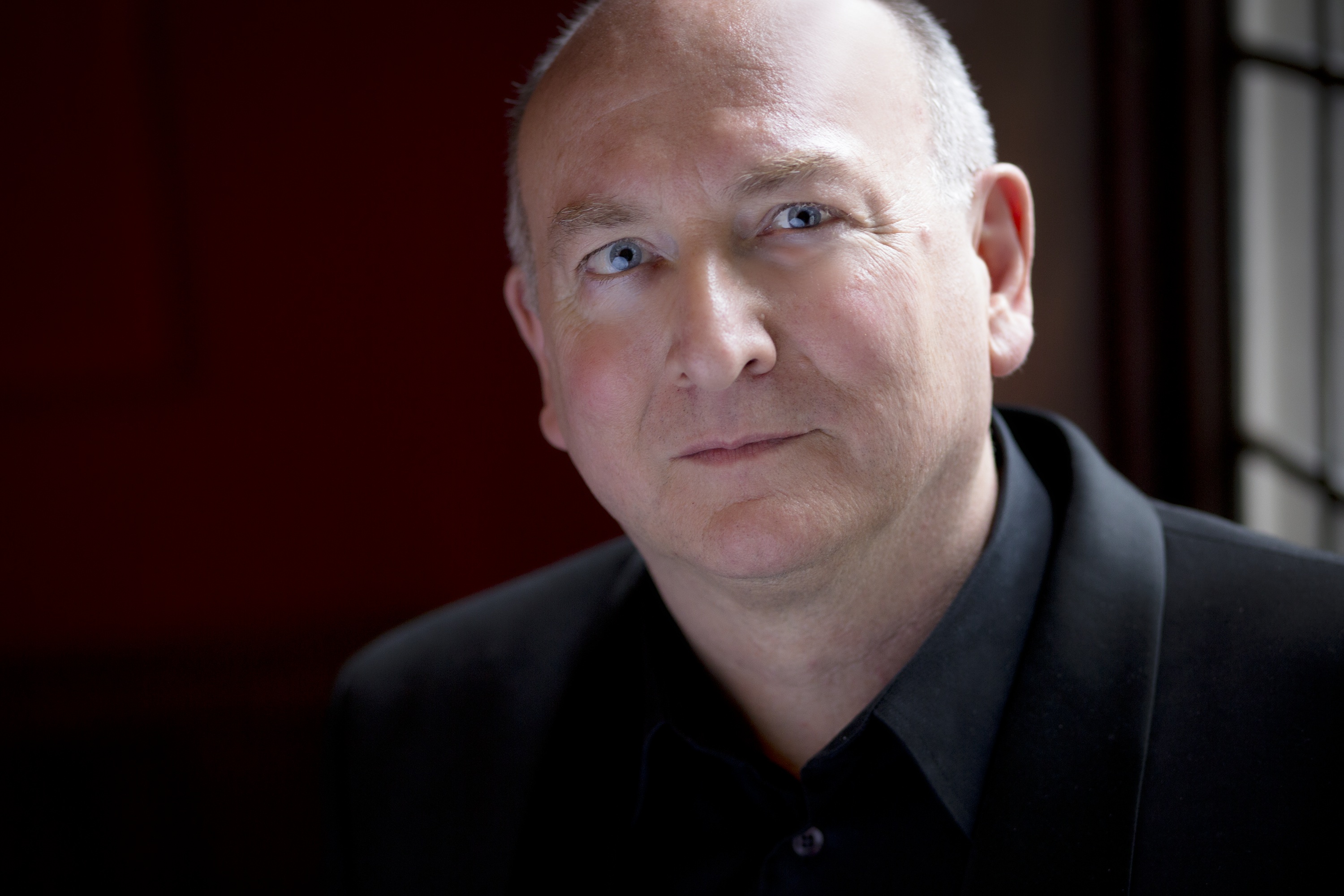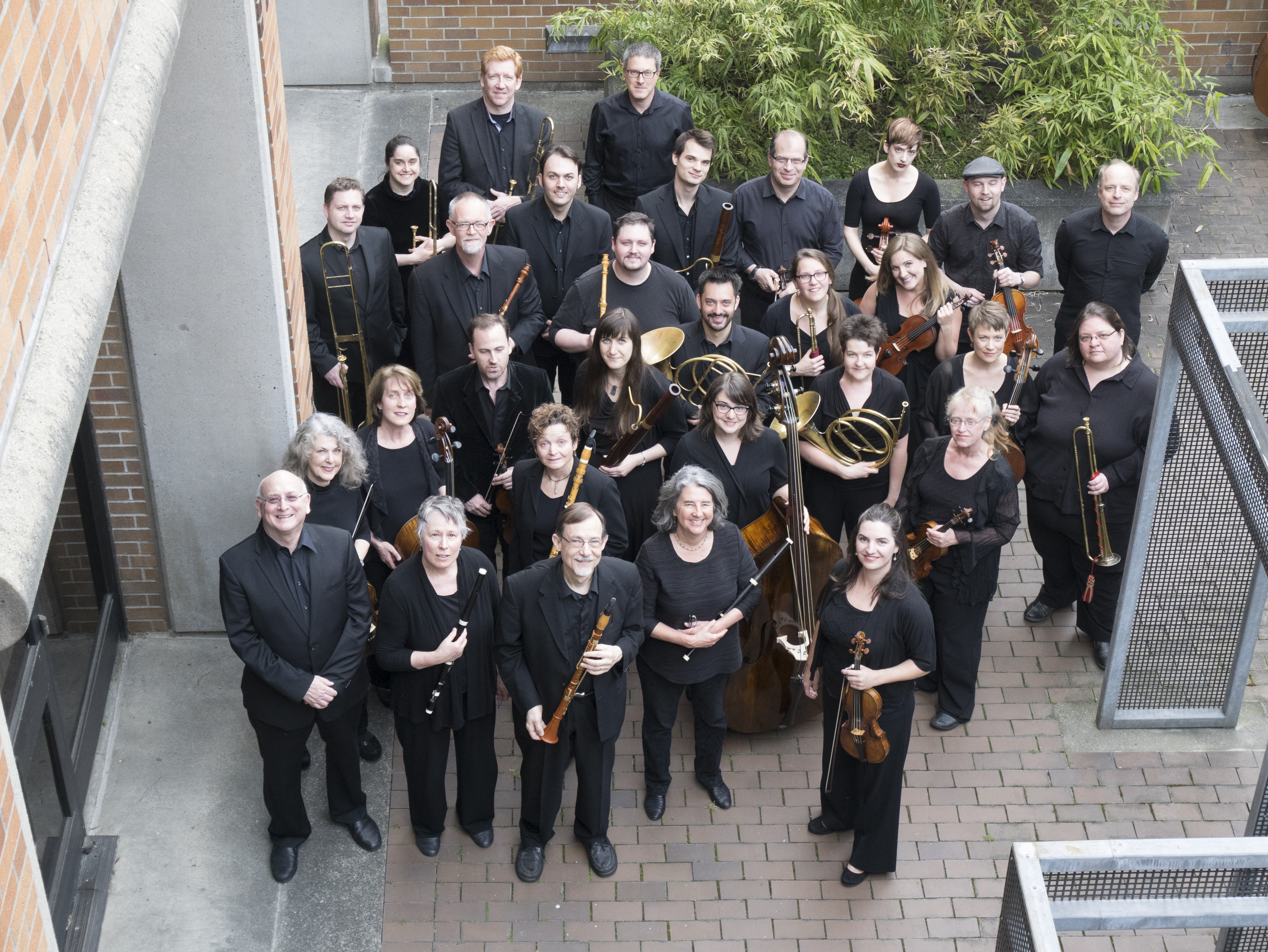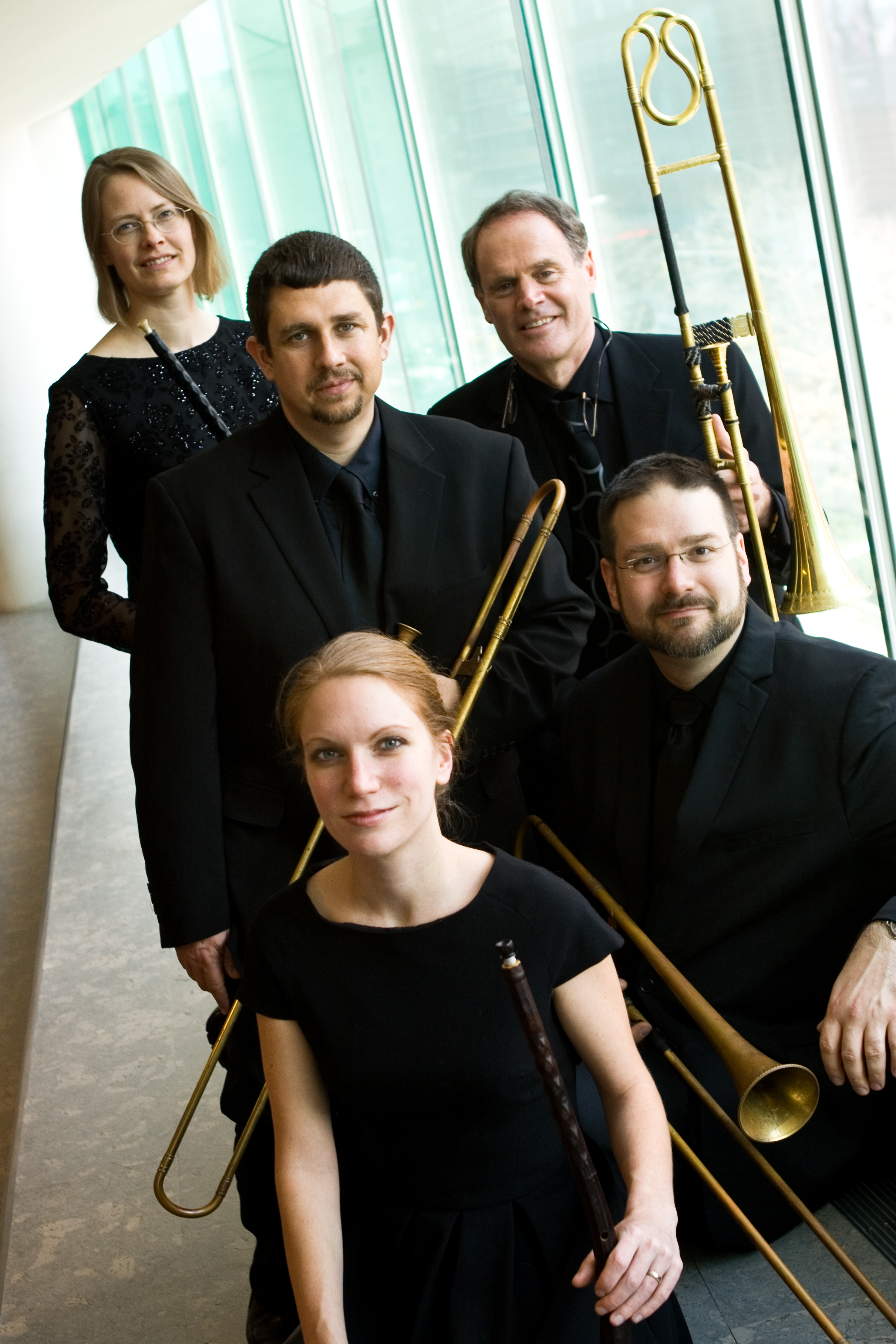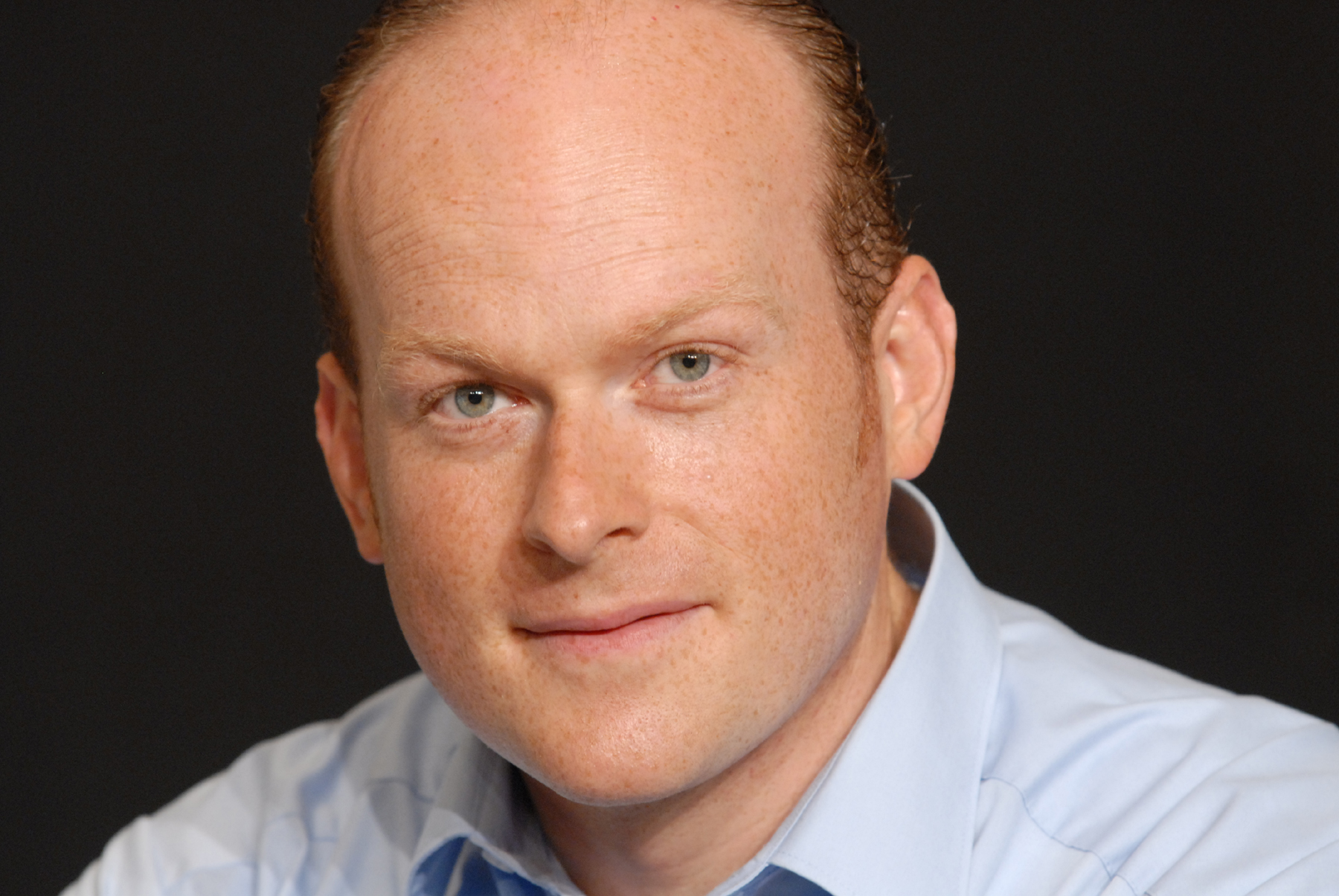Chan Shun Concert Hall at the Chan Centre for the Performing Arts | Map
Stephen Stubbs, music director; Pacific MusicWorks; Dark Horse Consort; Colin Balzer, Orfeo
Monteverdi’s Orfeo is the first unqualified masterpiece of operatic history. Full of dramatic word painting, narrative urgency, rich orchestration of exotic instruments as well as exquisite writing for vocal ensemble, it feels as fresh and full of relevance as it must have in the early 17th century. Monteverdi specialist and GRAMMY winner Stephen Stubbs leads his own ensemble, Pacific MusicWorks, in a concert version featuring Vancouver’s Colin Balzer in the title role.
‘The man is a genius. Oh, I meant Stubbs. But Monteverdi, too, was no slouch.’ – The Seattle Times
Supported by the Drance Family in honour of Stephen and Betty Drance and José Verstappen
Synopsis
After the opening Toccata, the Prologue presents La Musica, who greets the noble audience, praises the power of Music, and invites the onlookers to listen to the story of Orfeo.
ACT I
Nymphs and shepherds sing joyously in anticipation of the marriage of Orfeo and Euridice, and the couple sing of their love for each other. After dances of celebration, Euridice and Sylvia leave the company to prepare for the ceremony, while the nymphs and shepherds continue their festivities.
ACT II
Orfeo sings with his friends of his new found joy, and praises the natural beauty of the Arcadian surroundings in which he has found Euridice. Silvia breaks into their rejoicing to tell the terrible news of Euridice’s death after being bitten by a serpent. Devastated by her account, Orfeo vows to descend to Hades to reclaim Euridice, or to join her in death. As he departs, the company laments their grief at the loss of both the lovers.
ACT III
Orfeo is led by the allegorical figure of Hope to the banks of the river Styx, across which lies the Underworld, but then he must continue alone. Caronte, the guardian boatman, appears in front of him and blocks his path. Orfeo invokes all the power of his singing to convince Caronte to let him enter the Underworld, but the boatman is unmoved. Finally the singing lulls the guardian to sleep. Seizing his opportunity, Orfeo steals the boat and rows across the river. A chorus of infernal spirits marks his entrance into Hades and praises his audacity.
ACT IV
In the Underworld, Proserpina, wife of the ruler Plutone, has been moved by the prayers and laments of Orfeo as he roams in search of his lost love, and pleads with her husband to restore Euridice to him. Her husband, touched by her tender entreaties, decrees that Orfeo may lead Euridice home, but must not look at her while still in the Underworld or she will be lost for all eternity. Orfeo appears leading Euridice, and sings praises to the power of his lyre that has led to her redemption, but gradually, doubts creep into his mind that he is being tricked, and he glances back; infernal spirits immediately pronounce the sentence and Euridice, in despair, is lost forever. An infernal chorus proclaims that Orfeo could conquer Hell but not himself.
ACT V
Returning alone to the scene of his former joy, Orfeo laments his loss to Eco. He recalls the virtues of Euridice and vows never to love another woman. His father, Apollo, God of Music, descends and comforts Orfeo, and offers to lead him to eternal life and glory in Heaven, where he may see the likeness of Euridice in the sun and stars. As Orfeo and Apollo rise to Heaven singing, the chorus proclaims Orfeo’s celestial honour and declare that virtue will be justly rewarded, and a festive Moresca ends the fable.
Programme Notes
Written by Thomas Forrest Kelly for a performance of L’Orfeo by the Boston Early Music Festival in 2012.
Tomorrow evening the Most Serene Lord the Prince is to sponsor a play in the main room in the apartments which the Most Serene Lady of Ferrara had the use of. It should be most unusual, since all the actors are to sing their parts; it is said on all sides that it will be a great success. No doubt I shall be driven to attend out of sheer curiosity, unless I am prevented from getting in by the lack of space.
Carlo Magno’s 1607 letter to his brother, excerpted above, explains why it is hard for us to hear Monteverdi’s L’Orfeo in the same way as its original audience did. For us, Orfeo stands at the head of the long history of opera; it is in a tradition that includes Handel, Steffani, Lully, Mattheson, Mozart, Verdi, Wagner, and Strauss. And in that context it stands up for itself very well indeed; it is full of beautiful music, it requires passionate, lyrical, and florid singing, and it can make us weep with the best of them.
And yet it’s not an opera at all. There was no such thing in 1607. It’s a play; and for its creators it’s an attempt to re-create the power of classical Greek tragedy. Orfeo tells a Classical tale, and in a time in which Classical literature was being rediscovered and newly valued, scholars and intellectuals wanted to know what it was that gave such affective power to Classical theater. Part of the effect, they surmised, was that Classical Greek actors sang their parts, to the accompaniment of the ancient kithara, a plucked string instrument. So if we have our actors sing, and accompany them on, say a souped-up version of the chitarra (as we’d say in Italian), a big one, a chitarrone, we might well hope to achieve the effect that Greek tragedy had on its own audiences.
So Orfeo at its origin was an “early-music” performance, an attempt to recapture the sounds and the effects of the distant past, just as is the present performance by Pacific MusicWorks. We are evoking a performance of 400 years ago that itself sought to evoke a performance more than a millenium earlier still.
As spectators, we would be expecting a play. But the novelty about this play is that, as Carlo Magno says, all the actors sing their parts. We have a word for plays in which everybody sings—we call it opera; but that didn’t really exist. What a novelty it must have seemed! The singing was something added to a poetic libretto full of charm and literary delight, telling a story that we already know, but in newly-created elevated language.
Monteverdi’s job is to figure out how to make that singing contribute to the depth, the expressiveness, the power of the drama. And he is the perfect person for the job, in the perfect place to accomplish it.
First off, Monteverdi adopts the new stile recitativo, the reciting style, employed by some musical experimenters down in Florence in the last few years. This is a means of delivering words in spoken rhythm, at about the speed an actor would speak them, but with a melodic line and a simple chordal accompaniment; it was a Florentine invention, but Monteverdi turned it to spectacularly effective use, here and elsewhere.
There’s a risk that we will find recitative tedious—especially if we expect Mozart arias or Verdi heroines. But in the context of a play, it’s a magical addition, and Monteverdi is able to inflect it with amazing variety and skill, using harmony, dissonance, melody, rhythm—to make it always new and interesting.
Another way to avoid tedium is to have songs. And there are lots of songs, and dances, and instrumental pieces, in the course of Orfeo. The story is laid out to make this possible.
* * *
What better subject for a fable told in music than the story of Orpheus? He is, after all, the semi-god who is the greatest musician who ever lived, the son of Apollo, god of the sun, of music, of balance; a story about Orpheus will give plenty of occasion for music and singing. It is set in that mythical Arcadia where nymphs and shepherds frolic, sing, dance, without any concern for keeping watch over their flocks . . . .
So there is plenty of occasion for song as well as speech, and this presents Monteverdi with a challenge and an opportunity. Because if this is a play in which the actors sing their parts, we are to understand that what is happening on stage is the way things work: when people sing in that world, they are speaking. Fine: and if we like it, we stay. But what happens when, in a world in which people are already singing, somebody on stage says: “Orfeo, sing us a song!” How can this happen, if everybody is already singing? This is, of course, one of the major challenges of opera, and one of the major challenges of music with words. Words require one kind of delivery, and music generally requires another.
Monteverdi rises to this challenge beautifully; musically there is a whole range of singing, from absolutely syllabic speech-declamation through the most ornate and virtuosic musical lyricism.
Even though the room is small, the resources are princely. Monteverdi was able to make full use of the musical personnel of the Court of Mantua; he was its chief musician, he hired and fired, and he knew to the tiniest detail the abilities of his colleagues. The Rubini brothers, expert violinists, get their chances to show off; superstar cornetto players; an extraordinary double harp; they all get solo turns in the play’s central moment: Orfeo’s passionate, and virtuosic, appeal to Caronte, the gatekeeper of Hell, to allow him passage to the land of the dead, ruled over by Pluto.
* * *
The myth of Orpheus has been told for a long time and in many ways. It continues to be told, and will surely be told for a long time to come. Like so many myths, it survives because it reminds us of a universal truth. Orpheus falls in love with the mortal Euridice; she dies (in this telling, from a venomous snakebite), and Orpheus does what no mortal can, and pursues her to the realm of the dead, where Pluto agrees to release Euridice to him, but on one condition (we all know this story): as he leads her out of Hades, he must not look back to see whether she is following. And of course he does; who wouldn’t? The story of Orpheus is a human story re-enacted by every human every day: my heart tells me to look back, my head reminds me that I must not, what shall I do? (Do I really have to get up and go to work this morning? Couldn’t I just sleep a few minutes more?)
After the passionate scene in which Orfeo loses Euridice forever and is ejected from the lower world, he wanders through the lands he used to love but which now remind him of the lost Euridice; he sings a long and very beautiful soliloquy, in which he begins to speak to the echo that returns to him from the distant mountains. It is a mad scene; he begins by singing the praises of Euridice, he compares her to other women, he loses all control and despises all of womankind as hateful; that is the point where Ovid—and the printed poem we were holding in our hands, if we were at the first performance—calls for a band of wild women, worshippers of Bacchus, to tear him limb from limb in revenge for his hatred of women.
But a miracle happens! Just at the point where Orfeo has lost his reason, Apollo appears overhead in a cloud—a deus ex machina–and comes to calm his demented son. He takes him up to heaven, where he can be together forever with Euridice among the stars. A mighty duet, a chorus of amazement, and a final dance conclude this fable in music. What a surprise ending!
The whole story is also an expression of Renaissance neo-Platonist philosophy, surely appealing to the learned members of the Mantuan Academy for whom this play was meant.
We exist between two worlds—that of Apollo overhead, where light and rationality and balance pervade all, and that of Pluto below, where passion overwhelms everything else. It is in these three planes that this story takes place, and when Orfeo gets out of balance, when his passion overpowers his reason, it calls forth divine intervention from the god of balance in all things. The neo-Platonists of Renaissance Italy would have recognized, perhaps better than we, the extent to which this entertainment is a reflection of the thinking of its time.
Even in our time, though, the story is resonant, and the music is beautiful. We are in a room in a palace (Chan Centre for the Performing Arts) before a small and elite audience (you), and we have a story to tell, a fable in music. Don’t look back.
TEXTS AND TRANSLATIONS
Click here to view or download the texts and translations for this concert

Stephen Stubbs, music director
Stephen Stubbs, who won the GRAMMY® Award as conductor for Best Opera Recording 2015, spent a 30-year career in Europe. He returned to his native Seattle in 2006 as one of the world’s most respected lutenists, conductors, and baroque opera specialists.
In 2007 Stephen established his new production company, Pacific MusicWorks, based in Seattle. He is the Boston Early Music Festival’s permanent artistic co-director, recordings of which were nominated for five GRAMMY awards. Also in 2015 BEMF recordings won two Echo Klassik awards and the Diapason d’Or de l’Année.
In addition to his ongoing commitments to PMW and BEMF, other recent appearances have included Handel’s Amadigi for Opera UCLA, Mozart’s Magic Flute and Cosi fan Tutte in Hawaii, Handel’s Agrippina and Semele for Opera Omaha, Cavalli’s Calisto and Rameau’s Hippolyte et Aricie for Juilliard and Mozart’s Il re pastore for the Merola program in San Francisco. He has conducted Handel’s Messiah with the Seattle, Edmonton, Birmingham and Houston Symphony orchestras.
His extensive discography as conductor and solo lutenist includes well over 100 CDs, which can be viewed at stephenstubbs.com, many of which have received international acclaim and awards.
Stephen is represented by Schwalbe and Partners (schwalbeandpartners.com).

Pacific MusicWorks
Pacific MusicWorks (PMW) works to bring internationally renowned artists into collaboration with leading musicians from the Northwest, and to foster creative dialogue among artists from a broad array of fields and cultures. The heart of its repertoire is 17th– and 18th-century vocal music, but performances range from the Renaissance to innovative contemporary works and from chamber music to fully staged operas. Important projects have included a staged performance of Il Ritorno d’Ulisse in a production by South African artist William Kentridge, The Passions Project in collaboration with the Seattle Symphony and Ludovic Morlot as well as full stagings of operas in collaboration with the University of Washington (Gluck’s Orphée, Purcell’s Dido and Aeneas and Handel’s Semele).

Dark Horse Consort
The early music ensemble Dark Horse Consort is dedicated to unearthing the majestic late Renaissance and early Baroque repertoire for brass instruments. Inspired by the bronze horse statues in Venice’s famed St. Mark’s Basilica, the ensemble attempts to recreate the glorious sounds of composers such as Giovanni Gabrieli, Claudio Monteverdi and Heinrich Schütz. Dark Horse often expands to include vocalists and strings, which when combined recreates the rapturous kaleidoscope that was the sound of the early 17th century instrumental ensemble.
Dark Horse Consort has been featured on the San Francisco Early Music Series, the Boston Early Music Festival, the Renaissance and Baroque Society (Pittsburgh), The Academy of Early Music (Ann Arbor) in addition to multiple appearances throughout North America, including collaborations with vocal and instrumental groups such as The Toronto Consort, Blue Heron Choir (Boston), The Rose Ensemble (Minneapolis), Piffaro (Philadelphia), Tenet (NYC), Spire (Kansas City), Catacoustic Consort (Cincinnati), Bach Society Houston, Bach Collegium San Diego, Bach Vespers at Holy Trinity Lutheran (NYC), Seicento Baroque (Boulder), and the Clarion Music Society (NYC).
Upcoming performances include Monteverdi Vespers with the American Baroque Soloists in San Francisco, and Monteverdi’s L’Orfeo with Pacific MusicWorks in Seattle.
“BEMF Plus Dark Horse: Triumph” (Boston Musical Intelligencer)
“The magnificent trombones and cornetti…one of the best 1610 Vespers performances I have ever heard.” (Boston Musical Intelligencer)
“The Dark Horse Consort players were splendid.” (Boston Globe)
“The small orchestra played very well, notably…the cornet and Baroque trombone ensemble Dark Horse Consort, beautifully in tune, playing with subtlety and shading” (New York Arts)
“stellar music ensemble.” (New York Times)
Named by The New Yorker as a notable classical performance of 2013 (for a performance at the MET entitled, The Grand Tour)

Colin Balzer, Orfeo
Canadian lyric tenor Colin Balzer’s North American engagements include recitals at New York’s Frick Collection and on the Philadelphia Chamber Music series; concerts with the Portland, New Jersey, Utah, Victoria, Ann Arbor, Québec, Atlanta, and Indianapolis Symphonies; Early Music Vancouver; Tafelmusik and the Toronto Mendelssohn Choir; Les Violons du Roy; the National and Calgary Philharmonics; Ottawa’s National Arts Centre Orchestra; Musica Sacra and the Oratorio Society of New York at New York’s Carnegie Hall. In addition, he is regularly featured in opera productions at the Boston Early Music Festival.
Guest soloist appearances abroad include work with Collegium Vocale Gent led by Philippe Herreweghe, Fundacao OSESP Orchestra and Louis Langrée, Les Musiciens du Louvre under Marc Minkowski, Rotterdam Philharmonic led by Yannick Nézet-Séguin, Akademie für alte Musik under Marcus Creed, and the RIAS Kammerchor, Scottish Chamber Orchestra, Radio Kamer Filharmonie, Estonian Chamber Choir, and Musik Podium Stuttgart. Operatic forays include the role of Don Ottavio in Mozart’s Don Giovanni at the Bolshoi and in Aix-en-Provence and Mozart’s La finta giardiniera in Aix and Luxembourg.
Particularly esteemed as a recitalist, he has been welcomed at London’s Wigmore Hall, the Britten Festival in Aldeburgh, the Vancouver Chamber Music Festival, the Wratislavia Cantans in Poland, and at the Festspielhaus in Baden-Baden. Recordings to date include Wolf’s Italienisches Liederbuch and Eisler and Henze song anthologies. Mr. Balzer holds the rare distinction of earning the Gold Medal at the Robert Schumann Competition in Zwickau with the highest score in 25 years. Born in British Columbia, he received his formal musical training at the University of British Columbia with David Meek and with Edith Wiens at the Hochschule für Musik Nürnberg, Augsburg.




